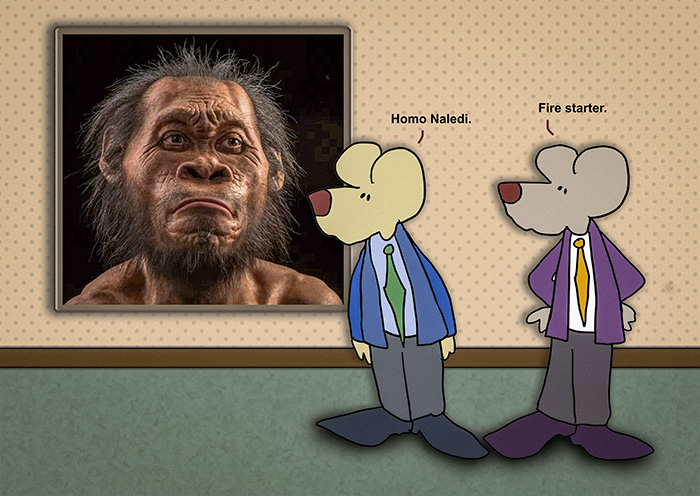I can’t help but to see Tom Hanks on the beach, half-nakers in his little loincloth, building fire. This, of course, comes from the great movie Castaway. He pounds his chest and screams to the heavens, “Fire! Fire! I have created fire!” A lot of times, I revamp this scene whenever I build a campfire or put a log in the wood-burning stove.
Yes. “Man mastering fire.” That has been a long-standing historic moment in our lineage. We don’t know who did it exactly, but at some point, some man or woman mastered fire.
At least.
That is what we thought.
There is new evidence now that tells us differently. Man was not the first to master fire. Woman either.
This realization came in the way of a momentous discovery in South Africa. And it has turned our understanding of human history upside down.
A paleontologist named Lee Berger has found evidence that a pre-human ancestor named “Homo Naledi” was the first being to master fire for light, warmth, and cooking.
Fire is a big deal. It was an especially big deal back then, in prehistoric times. Our ability to control fire changed human evolution. The struggle must have been hard without fire. I imagine people died more quickly in the cold of winter. But having fire allowed our ancestors to stay warm, cook food, and ward off predators. It also allowed humans to explore new and harsher climates.
It also had social implications. Building a big community fire encouraged groups of people to gather. Hey, they probably stayed up late, roasting Sabertooth Tiger Dogs and Wooly Mammoth Kabobs.
But when and where our human ancestors learned how to create fire has long been a subject of debate and speculation. There’s been no agreement on which hominins (modern humans) made the spark. The oldest, undisputed evidence had been found at Israel’s Qesem Cave. This dated back 300,000 to 400,000 years.
But now, a new discovery has come forward. An international team of archaeologists has found what appear to be traces of campfires that flickered one million years ago.
They uncovered charred animal bones and ashed plant remains from a place in South Africa — the Wonderwerk Cave. The researchers found the evidence in a layer of rock. And a pre-human ancestor is the creature who made that fire. The “Homo Naledi” is said to have had an upright stance and robust build. This early hominin species lived starting from around 1.8 million years ago.
And they are certain these folks were using fire way back then.
Why do I care?
Because I believe our world, our Universe, is much more expansive than any of us can fathom at this point in our humanness. We have absolutely no idea how the energy works in this Universe.
So when we find new information about our history, it just reinforces how much we do not know.
Consider medicine, for example. The man who developed the lobotomy won the Nobel Prize in Physiology or Medicine in 1949 (Antonio Egas Moniz). Of course, now lobotomies are banned, as they have been deemed barbaric.
Or how about doctors prescribing smoking as a weight loss technique up until the 1950s? Not so smart.
And here we are. People will look back on our behavior here in 2023 and call us obtuse.
Fire came much earlier than we thought to a pre-human species.
And what will come in the future?
Only with continued enlightenment will humans proceed with the discovery.
And that remains a huge question.
====
“Your own Self-Realization is the greatest service you can render the world.”
― Ramana Maharshi
=====
“What is wanted is not the will to believe, but the will to find out, which is the exact opposite.”
― Bertrand Russell
=====
“The road to enlightenment is long and difficult, and you should try not to forget snacks and magazines.”
― Anne Lamott, Traveling Mercies
=====
We didn’t know. We were fired a long time ago.
